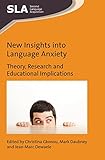New Insights into Language Anxiety : Theory, Research and Educational Implications / ed. by Christina Gkonou, Mark Daubney, Jean-Marc Dewaele.
Material type: TextSeries: Second Language AcquisitionPublisher: Bristol ; Blue Ridge Summit : Multilingual Matters, [2017]Copyright date: ©2017Description: 1 online resourceContent type:
TextSeries: Second Language AcquisitionPublisher: Bristol ; Blue Ridge Summit : Multilingual Matters, [2017]Copyright date: ©2017Description: 1 online resourceContent type: - 9781783097715
- 9781783097722
- Anxiety
- Language and languages -- Study and teaching -- Psychological aspects
- Second language acquisition -- Research
- LANGUAGE ARTS & DISCIPLINES / Linguistics / Psycholinguistics
- Educational psychology
- Language anxiety
- Language learning
- Language teaching
- Learner emotions
- Psychology of language learning and teaching
- SLA
- Second Language Acquisition
- P53.7 .N39 2017
- online - DeGruyter
- Issued also in print.
| Item type | Current library | Call number | URL | Status | Notes | Barcode | |
|---|---|---|---|---|---|---|---|
 eBook
eBook
|
Biblioteca "Angelicum" Pont. Univ. S.Tommaso d'Aquino Nuvola online | online - DeGruyter (Browse shelf(Opens below)) | Online access | Not for loan (Accesso limitato) | Accesso per gli utenti autorizzati / Access for authorized users | (dgr)9781783097722 |
Frontmatter -- Contents -- Contributors -- 1. Introduction -- Part 1: Theoretical Insights -- 2. An Overview of Language Anxiety Research and Trends in its Development -- 3. On the Misreading of Horwitz, Horwitz and Cope (1986) and the Need to Balance Anxiety Research and the Experiences of Anxious Language Learners -- Part 2: Empirical Investigations -- 4. Anxiety and L2 Self-Images: The 'Anxious Self' -- 5. Are Perfectionists More Anxious Foreign Language Learners and Users? -- 6. Social Anxiety and Silence in Japan's Tertiary Foreign Language Classrooms -- 7. Do You See What I Feel? An Idiodynamic Assessment of Expert and Peer's Reading of Nonverbal Language Anxiety Cues -- 8. Towards an Ecological Understanding of Language Anxiety -- 9. Exploring the Relationship between Anxiety and Advanced Hungarian EFL Learners' Communication Experiences in the Target Language: A Study of High- vs Low-Anxious Learners -- Part 3: Implications for Practice -- 10. Anxious Language Learners Can Change Their Minds: Ideas and Strategies from Traditional Psychology and Positive Psychology -- 11. The Links Between Self-Esteem and Language Anxiety and Implications for the Classroom -- 12. Conclusion -- Index
restricted access online access with authorization star
http://purl.org/coar/access_right/c_16ec
This book provides an overview of current theory, research and practice in the field of language anxiety and brings together a range of perspectives on this psychological construct in a single volume. Chapters in the volume are divided into three sections. Part 1 revisits language anxiety theory, showing that it can be viewed as a complex and dynamic construct and that it is linked to other psychological variables, such as the self and personality. In Part 2, a series of contextualised studies on language anxiety are presented, with a key feature of these studies being the diverse research designs which are applied in different instructional settings across the globe. Part 3 bridges theory and practice by presenting coping strategies and practice activities with a view to informing classroom practice and pedagogical interventions.
Issued also in print.
Mode of access: Internet via World Wide Web.
In English.
Description based on online resource; title from PDF title page (publisher's Web site, viewed 24. Apr 2022)


